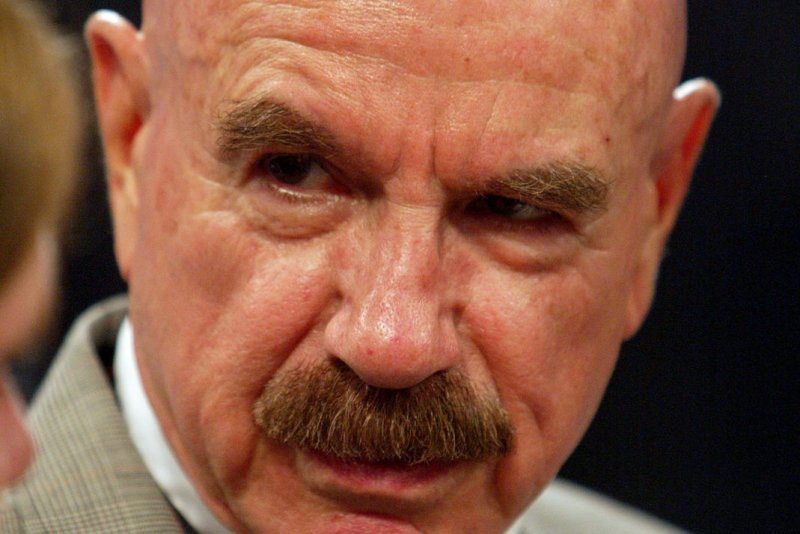WASHINGTON — Shutting down the Line 5 pipeline would create a "dangerous precedent" that would forever imperil future cross-border infrastructure projects between Canada and the United States, says Alberta's energy minister.msnewslogo
Search the web
Skip To Navigation Skip To Content Skip To Footer
Sign in
EN
AdChoices
The Canadian Press
Alberta, Saskatchewan, Ontario unite to urge Michigan not to shut down Line 5
17 hrs ago
2 Comments
|
3
Elliot Page, Leyna Bloom and the trans artists forcing a shift in media…
From Macpherson to Windrush: UK inquiries into racial injustice
WASHINGTON — Shutting down the Line 5 pipeline would create a "dangerous precedent" that would forever imperil future cross-border infrastructure projects between Canada and the United States, says Alberta's energy minister.
a flat screen television© Provided by The Canadian Press
Sonya Savage joined counterparts from Saskatchewan and Ontario in warning a House of Commons committee Tuesday about the knock-on effects that could result if the cross-border pipeline is shut down.
"What is possibly most concerning to Alberta, as it should be for everyone here, is the dangerous precedent that a shutdown of a safely operating pipeline would have and would pose for future infrastructure projects," Savage testified.
"We are good neighbours and strong business partners. Our integrated energy sector and critical trading relationships are important for jobs and economies on both sides of the border, and any actions to shut down Line 5 would threaten that relationship."
New Arena
[Gallery] One Photo Almost Derailed This Pole Vaulter’s Promising Career
SEE MORE
Sponsored by NEW ARENA
Line 5, which runs through Michigan from the Wisconsin city of Superior to Sarnia, Ont., crosses the Great Lakes beneath the environmentally sensitive Straits of Mackinac, which link Lake Michigan to Lake Huron.
For weeks, experts have been telling the committee that the pipeline is a vital source of energy not only for Ontario and Quebec, but a host of northern U.S. states as well, including Michigan itself, Ohio and Pennsylvania.
Enbridge wants to build a tunnel underneath the straits to house an upgraded version of the dual pipeline — a project Michigan has already approved — but needs the existing line to continue to operate in the meantime.
Michigan Gov. Gretchen Whitmer has revoked the 1953 easement that allowed the pipeline to operate without incident for more than 65 years, accusing Enbridge of violating the terms of the agreement. She wants the line shut down by mid-May.
Enbridge is fighting that decision in court in Michigan — and Savage, Saskatchewan Energy Minister Bronwyn Eyre and Associate Ontario Energy Minister Bill Walker want Ottawa to weigh in on that fight.
"This could include filing an amicus brief in court expressing the government's support for keeping the pipeline in operation," Walker told the committee.
One senior federal government official, speaking on condition of anonymity in order to discuss internal matters, said filing such a brief is currently under discussion, but a final decision has not been made.
Video: Alberta considering more COVID-19 restrictions but no decisions yet: Hinshaw (Global News)
Pause
Ad 00:08 - up next "Alberta considering more COVID-19 restrictions but no decisions yet: Hinshaw"
Unmute
0
Alberta considering more COVID-19 restrictions but no decisions yet: Hinshaw
Witnesses also urged the federal government to exercise its rights under the 1977 Transit Pipeline Agreement, a Canada-U.S. treaty that provides for the uninterrupted flow of energy between the two countries.
The Enbridge main line, and by extension Line 5, carry as much as 70 per cent of the crude oil produced in Saskatchewan to market, Eyre said.
Line 5 is a "welded-steel manifestation, a tangible symbol, of a traditionally strong relationship, a friendship, between the United States and Canada — one we must not jeopardize," she said.
"Pipelines produce no CO2 — they are a mere mode of transport, and yet they have become a symbol of the fight (over climate change)."
Sarnia Mayor Mike Bradley, whose city is a major refining hub in Ontario and the final juncture for Line 5, could barely contain his frustration with Whitmer, whom he said has been unresponsive to repeated entreaties.
"I've written more letters to the governor than St. Paul wrote to the Corinthians," he said, noting that Canada's consul general in Detroit and Ontario Premier Doug Ford have had the same experience.
"I can't fathom what is going on in the governor's mansion in Lansing ... does the governor not understand the damage (she's doing) to the ongoing relationship?"
In a letter to Whitmer earlier this year, Enbridge accused Michigan of refusing to acknowledge that the state's own experts say there are no clear alternatives to the pipeline.
The state "fails to acknowledge that Line 5 enables the safe transport of fuel essential to heat homes and provides energy to Michigan, neighbouring U.S. states and Canada's two largest provinces," Enbridge executive vice-president Vern Yu wrote.
"It also fails to account for the significant adverse social and economic impacts that will result from closure."
Scott Archer, a union leader in Sarnia, delivered a stark inventory of what those impacts might be if Line 5 is closed.
Archer warned of immediate gasoline shortages, "massive" fuel cost increases, and 800 more oil-laden rail cars and 2,000 tanker trucks per day on railways and highways throughout both central Canada and the U.S. Midwest — to say nothing of widespread job losses in a variety of industries, many of them only tangentially related to the energy sector.
"In short, shutting down Line 5 would effectively kill my hometown, and displace its families — and many more cities and towns like it in Canada and the U.S.," he said.
"This is not an exaggeration — it's cold, hard fact."
This report by The Canadian Press was first published March 30, 2021.

© Provided by The Canadian Press
Sonya Savage joined counterparts from Saskatchewan and Ontario in warning a House of Commons committee Tuesday about the knock-on effects that could result if the cross-border pipeline is shut down.
Sonya Savage joined counterparts from Saskatchewan and Ontario in warning a House of Commons committee Tuesday about the knock-on effects that could result if the cross-border pipeline is shut down.
"What is possibly most concerning to Alberta, as it should be for everyone here, is the dangerous precedent that a shutdown of a safely operating pipeline would have and would pose for future infrastructure projects," Savage testified.
"We are good neighbours and strong business partners. Our integrated energy sector and critical trading relationships are important for jobs and economies on both sides of the border, and any actions to shut down Line 5 would threaten that relationship."
Line 5, which runs through Michigan from the Wisconsin city of Superior to Sarnia, Ont., crosses the Great Lakes beneath the environmentally sensitive Straits of Mackinac, which link Lake Michigan to Lake Huron.
For weeks, experts have been telling the committee that the pipeline is a vital source of energy not only for Ontario and Quebec, but a host of northern U.S. states as well, including Michigan itself, Ohio and Pennsylvania.
Enbridge wants to build a tunnel underneath the straits to house an upgraded version of the dual pipeline — a project Michigan has already approved — but needs the existing line to continue to operate in the meantime.
Michigan Gov. Gretchen Whitmer has revoked the 1953 easement that allowed the pipeline to operate without incident for more than 65 years, accusing Enbridge of violating the terms of the agreement. She wants the line shut down by mid-May.
Enbridge is fighting that decision in court in Michigan — and Savage, Saskatchewan Energy Minister Bronwyn Eyre and Associate Ontario Energy Minister Bill Walker want Ottawa to weigh in on that fight.
"This could include filing an amicus brief in court expressing the government's support for keeping the pipeline in operation," Walker told the committee.
One senior federal government official, speaking on condition of anonymity in order to discuss internal matters, said filing such a brief is currently under discussion, but a final decision has not been made.
Witnesses also urged the federal government to exercise its rights under the 1977 Transit Pipeline Agreement, a Canada-U.S. treaty that provides for the uninterrupted flow of energy between the two countries.
The Enbridge main line, and by extension Line 5, carry as much as 70 per cent of the crude oil produced in Saskatchewan to market, Eyre said.
Line 5 is a "welded-steel manifestation, a tangible symbol, of a traditionally strong relationship, a friendship, between the United States and Canada — one we must not jeopardize," she said.
"Pipelines produce no CO2 — they are a mere mode of transport, and yet they have become a symbol of the fight (over climate change)."
Sarnia Mayor Mike Bradley, whose city is a major refining hub in Ontario and the final juncture for Line 5, could barely contain his frustration with Whitmer, whom he said has been unresponsive to repeated entreaties.
"I've written more letters to the governor than St. Paul wrote to the Corinthians," he said, noting that Canada's consul general in Detroit and Ontario Premier Doug Ford have had the same experience.
"I can't fathom what is going on in the governor's mansion in Lansing ... does the governor not understand the damage (she's doing) to the ongoing relationship?"
In a letter to Whitmer earlier this year, Enbridge accused Michigan of refusing to acknowledge that the state's own experts say there are no clear alternatives to the pipeline.
The state "fails to acknowledge that Line 5 enables the safe transport of fuel essential to heat homes and provides energy to Michigan, neighbouring U.S. states and Canada's two largest provinces," Enbridge executive vice-president Vern Yu wrote.
"It also fails to account for the significant adverse social and economic impacts that will result from closure."
Scott Archer, a union leader in Sarnia, delivered a stark inventory of what those impacts might be if Line 5 is closed.
Archer warned of immediate gasoline shortages, "massive" fuel cost increases, and 800 more oil-laden rail cars and 2,000 tanker trucks per day on railways and highways throughout both central Canada and the U.S. Midwest — to say nothing of widespread job losses in a variety of industries, many of them only tangentially related to the energy sector.
"In short, shutting down Line 5 would effectively kill my hometown, and displace its families — and many more cities and towns like it in Canada and the U.S.," he said.
"This is not an exaggeration — it's cold, hard fact."
This report by The Canadian Press was first published March 30, 2021.
James McCarten, The Canadian Press













 © Provided by National Post The Irish government's 'Our Rural Future' strategy includes the creation of more than 400 remote working hubs in locations, potentially, such as Galway.
© Provided by National Post The Irish government's 'Our Rural Future' strategy includes the creation of more than 400 remote working hubs in locations, potentially, such as Galway. © REUTERS/Johanna Geron The COVID-19 pandemic has delivered ‘an unparalleled opportunity’ to balance economic recovery across Ireland, says the Irish Taoiseach Micheál Martin.
© REUTERS/Johanna Geron The COVID-19 pandemic has delivered ‘an unparalleled opportunity’ to balance economic recovery across Ireland, says the Irish Taoiseach Micheál Martin. © John Cogill/Bloomberg News Life in Kilkenny, with 26,500 people, is a far cry from the pace in Dublin.
© John Cogill/Bloomberg News Life in Kilkenny, with 26,500 people, is a far cry from the pace in Dublin.





